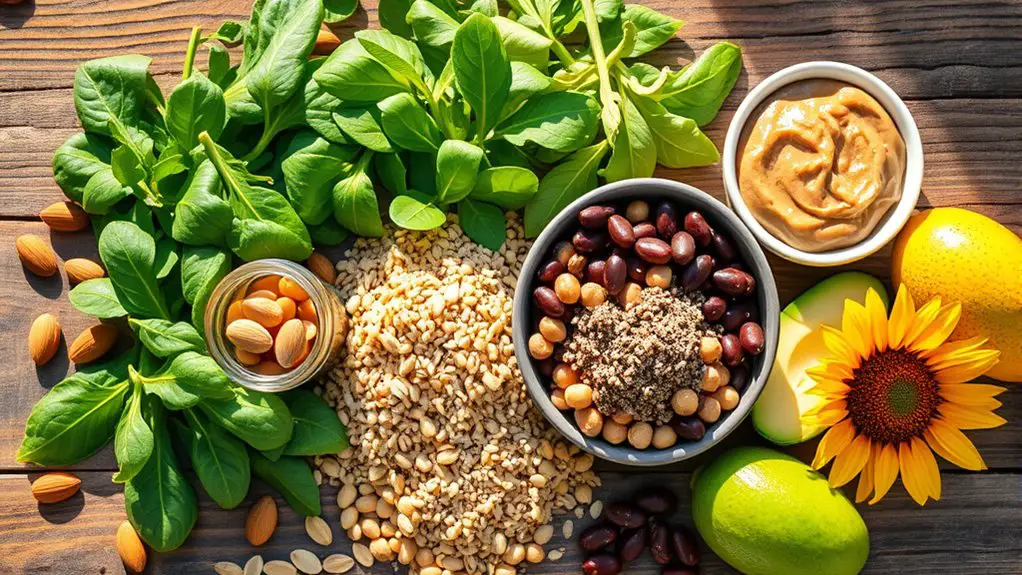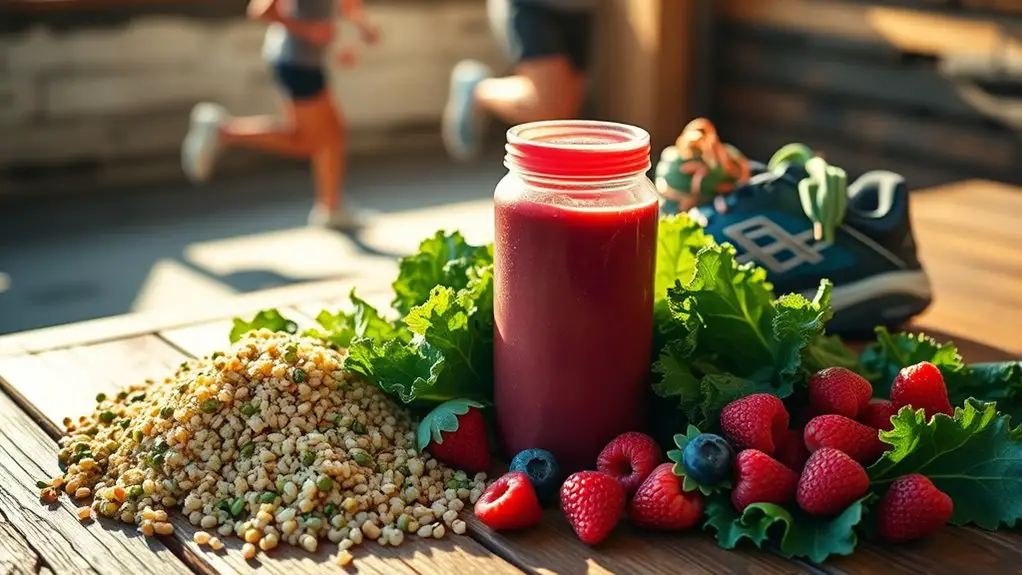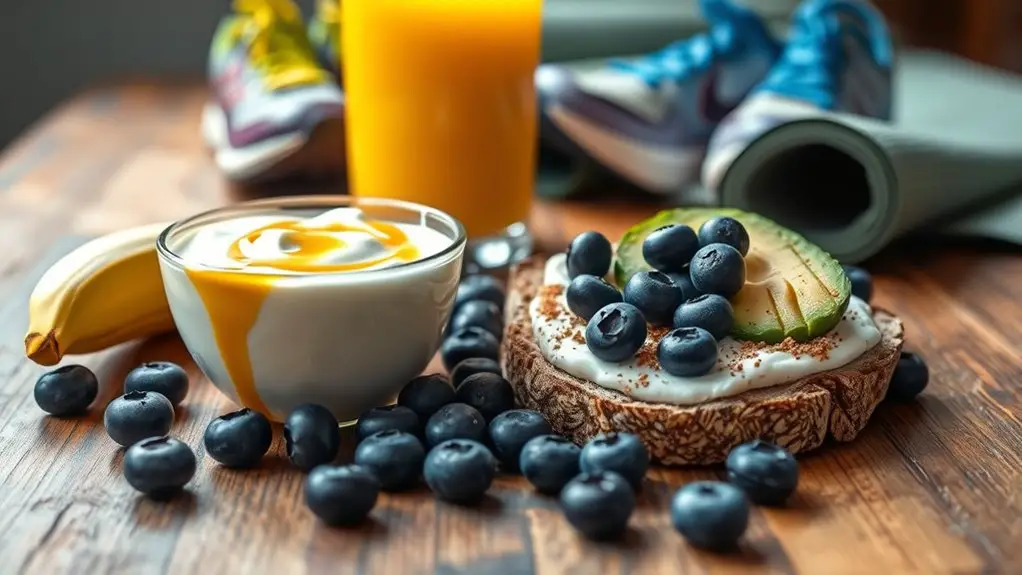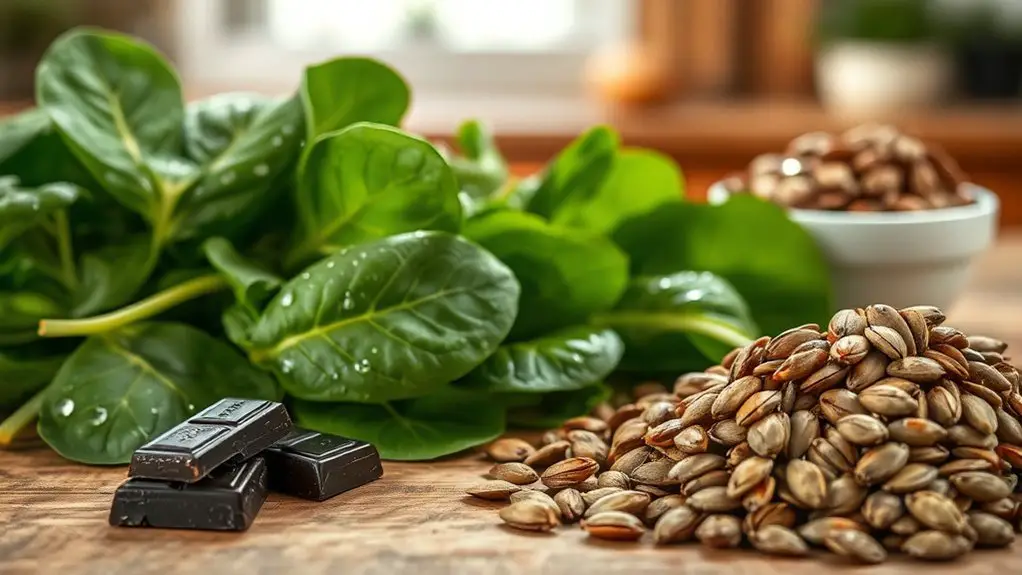If you're looking for the best vegan protein sources to fuel your athletic performance, consider legumes, quinoa, nuts, seeds, tofu, tempeh, and plant-based protein powders. Legumes are packed with amino acids, while quinoa is a complete protein grain. Nuts and seeds provide healthy fats and quick energy, and tofu and tempeh offer versatile cooking options. For an easy boost, try plant-based protein powders. There's much more to discover about how these options can enhance your training!
Legumes: Powerhouses of Plant Protein
Legumes are often hailed as the ultimate plant protein source for athletes. Packed with essential amino acids, they're perfect for fueling your workouts and helping you recover. Whether you're tossing chickpeas in a salad or enjoying a hearty lentil stew, these powerhouses bring versatility to your plate. They're not just protein-rich; legumes also offer fiber, vitamins, and minerals, supporting your overall health and performance. Plus, they're budget-friendly and easy to prepare, giving you the freedom to experiment in the kitchen. By incorporating beans, peas, and lentils into your meals, you'll not only boost your protein intake but also embrace a vibrant, plant-based lifestyle. So, why not unlock the potential of legumes and elevate your athletic journey?
Quinoa: A Complete Protein Grain
Quinoa stands out as a top choice for athletes seeking a complete protein grain. Packed with all nine essential amino acids, it's an excellent option for anyone looking to fuel their body. Plus, it's gluten-free and versatile, making it easy to incorporate into your meals. Here are three reasons why quinoa deserves a spot in your pantry:
Quinoa is a complete protein, gluten-free, and easy to prepare, making it a must-have for fueling your body.
- Nutrient-Rich: Quinoa is loaded with vitamins and minerals, including magnesium, iron, and B vitamins.
- Energy Boosting: The complex carbohydrates provide sustained energy, perfect for intense workouts.
- Easy to Prepare: Cooking quinoa is simple and quick, giving you a hassle-free protein source.
Nuts and Seeds: Nutrient-Dense Fuel
When you're looking for a quick and nutritious energy boost, nuts and seeds are hard to beat. Packed with protein, healthy fats, and essential vitamins, these tiny powerhouses can fuel your active lifestyle. Almonds, walnuts, chia seeds, and hemp seeds offer rich nutrient profiles that support muscle recovery and overall health. They're versatile too—snack on them raw, sprinkle them on your smoothies, or blend them into energy bars. Plus, they're easy to carry, making them the perfect on-the-go option for busy athletes. Embrace the freedom of variety by experimenting with different combinations. By incorporating nuts and seeds into your diet, you'll guarantee you're getting the energy you need without sacrificing your plant-based principles. Enjoy the journey!
Tofu and Tempeh: Versatile Soy Options
Tofu and tempeh are two of the most versatile and protein-rich options available for plant-based athletes, making them essential staples in your diet. Both are derived from soybeans and can be incorporated into countless dishes, providing you with the freedom to explore various flavors and cuisines.
Here are three reasons to include them in your meals:
- High Protein Content: Tofu offers about 10 grams of protein per ½ cup, while tempeh packs around 15 grams in the same serving.
- Nutrient-Rich: They're loaded with essential amino acids, iron, and calcium, supporting your overall health and performance.
- Culinary Flexibility: Whether you stir-fry, grill, or marinate, tofu and tempeh adapt beautifully to any recipe, keeping your meals exciting.
Plant-Based Protein Powders: Convenient Supplements
If you're looking for a quick and effective way to boost your protein intake, plant-based protein powders can be a game-changer for athletes. They're convenient, versatile, and packed with nutrients. You can easily mix them into smoothies, oatmeal, or even baked goods. Here's a quick comparison of popular options:
| Protein Powder | Protein Content (per 30g) | Flavor Profile |
|---|---|---|
| Pea Protein | 24g | Earthy, nutty |
| Brown Rice Protein | 22g | Mild, slightly sweet |
| Hemp Protein | 15g | Nutty, grassy |
Experimenting with different powders can help you find the perfect match for your taste and nutritional needs. Embrace the freedom to customize your protein sources for peak performance!
Seitan: The Meat Alternative for Protein Seekers
For athletes seeking a hearty protein source that mimics the texture of meat, seitan stands out as an excellent option. Made from essential wheat gluten, it's packed with protein and can elevate your meals without sacrificing flavor. Here are three reasons to contemplate incorporating seitan into your diet:
- High Protein Content: Seitan contains about 25 grams of protein per 3.5-ounce serving, making it an ideal choice for muscle repair and growth.
- Versatile Culinary Uses: You can grill, sauté, or stir-fry seitan, allowing you to enjoy a variety of dishes that satisfy your cravings.
- Low in Carbs: With minimal carbohydrates, seitan fits well into low-carb diets while delivering essential nutrients.
Give seitan a try, and enjoy the freedom of delicious, protein-rich meals!
Frequently Asked Questions
How Much Protein Do Athletes Need on a Vegan Diet?
Think of your body as a well-tuned engine; it needs the right fuel. As a vegan athlete, you should aim for about 1.2 to 2.0 grams of protein per kilogram of body weight daily.
Can I Get Enough Protein From a Vegan Diet Alone?
Yes, you can absolutely get enough protein from a vegan diet alone. With careful planning and a variety of foods, you'll find plenty of plant-based sources that meet your protein needs while enjoying culinary freedom.
Are There Risks of Protein Deficiency for Vegan Athletes?
Yes, there're risks of protein deficiency for vegan athletes. If you're not mindful, if you're not planning meals, and if you're not diversifying protein sources, you might struggle to meet your nutritional needs effectively.
What Are the Best Times to Consume Vegan Protein?
You should consume vegan protein shortly after workouts for muscle recovery and throughout the day to maintain energy levels. Spreading intake across meals keeps your body fueled and supports overall health, helping you thrive.
How Do I Combine Protein Sources for Optimal Nutrition?
Think of your plate as a painter's palette. To craft a masterpiece, mix legumes with grains, nuts with seeds. This symphony of proteins creates harmony, ensuring you've got all the essential nutrients for your vibrant journey.




